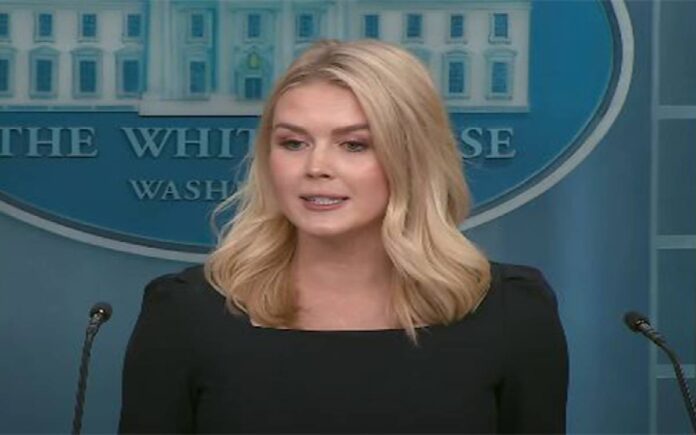Washington, DC: U.S. President Donald Trump has reiterated his controversial stance on Canada, maintaining that the country would “greatly benefit” from becoming the 51st state of the United States. In a press briefing on Tuesday, White House Press Secretary Karoline Leavitt confirmed that Trump’s position remains unchanged, despite a recent pause in public comments on the matter.
Responding to a question about whether Trump has softened his stance toward Canada, Leavitt clarified,
“I would reject the president’s position on Canada has shifted, perhaps, he just hasn’t been asked about Canada by questions from this group in the Oval Office when they see him almost every day. However, the president still maintains his position on Canada. The United States has been subsidising Canada’s national defence, and he believes that Canadians would benefit greatly from becoming the 51st state of the United States of America”.
Trump has made similar remarks in the past, repeatedly suggesting that Canada should be incorporated into the United States. He has even mocked former Canadian Prime Minister Justin Trudeau by referring to him as the “Governor of Canada”.
🇺🇸 Trump on Trade and Tariffs
While addressing broader economic matters, Press Secretary Leavitt also touched upon Trump’s views on trade flexibility, particularly regarding the U.S. auto industry. When asked about potential tariff relief for automakers, she said:
“As for autos and auto parts, I don’t have anything to read out for you there but I think the point the president was making is flexibility and he has flexibility when it comes to negotiations and talks but ultimately his goal in his fair trade deals that he is pursuing with many countries around the world is to put the American worker first”.
She added that automakers and auto workers visiting the White House on Liberation Day expressed strong confidence in Trump’s negotiating approach and commitment to bringing jobs back to the U.S.
Flexibility in Focus: Potential Relief for Carmakers
Speaking at a bilateral meeting with El Salvador’s President Nayib Bukele on Monday, Trump signaled possible exemptions from new tariffs for car companies, particularly those transitioning to using parts manufactured outside the U.S.
“I’m looking at something to help some of the car companies, where they are switching to parts that were made in Canada, Mexico and other places”, he said.
“They’re going to make them here, but they need a little bit of time — so I’m talking about things like that”.
Trump emphasized the importance of being adaptable amid ongoing global trade negotiations, stating:
“Look, I’m a very flexible person. I don’t change my mind, but I’m flexible, and you have to be. You just can’t have a wall, and you’ll only — sometimes you have to go around it, under it or above it”.
Global Trade Moves and China Tariffs
The press conference follows a sharp escalation in trade tensions with China. On April 9, Trump announced an immediate increase in tariffs on Chinese goods to 125%, following Beijing’s decision to hike tariffs on American products from 34% to 84% effective April 10.
In a balancing act, Trump simultaneously declared a 90-day pause and significant tariff reductions for 75 countries that had contacted U.S. trade representatives for negotiations, indicating a willingness to renegotiate and recalibrate trade deals.
As Trump continues to take a hardline yet “flexible” stance on global trade, his renewed push for integrating Canada into the U.S. reflects his long-standing views on national security costs and economic synergy. While the idea remains highly provocative on both sides of the border, it underscores Trump’s broader political messaging: prioritize American strength, streamline alliances, and reimagine international partnerships—even through controversial proposals.



